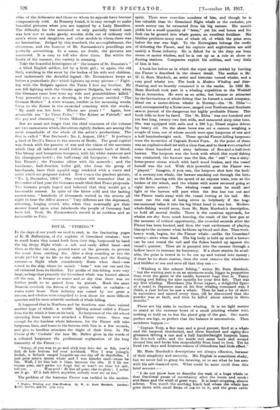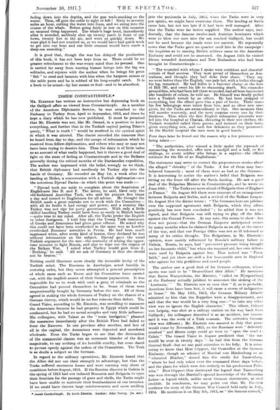ROYAL " FISHING.".
IN the days of our youth we used to read, in the fascinating pages of R. M. Bellantyne, of the exploits of Greenland whalers how in small boats they issued forth from their ship, harpooned by hand the big sleepy Right whale—a soft and easily killed beast—and then, as the lino ran out, poured water on the gunwale to prevent the wood from catching fire. After a deep sounding or two the whole yielded up its life to the stabs of lances, and the floating carcuse—a Right whale considerately floats when dead—was towed to the ship, where its mouth " bone " was cut out mid the oil extracted from its blubber. The profits of this fishing were very large, so large that presently the Greenland whale was hunted almost off the seas. It became so scarce and so shy that them was no further profit to be gained from its pursuit. Much the same Nemesis overtook the fishers of the sperm whale or cachalot—a warm water boast. Their industry was ruined by too great a success, and whalem were compelled to look about for more difficult (marries and for more scientific methods of whale-killing.
It happened that in Northern and far Southern sees there existed another type of whale, a terrific fighting animal called a Finner from the fin which it bore on ite back. No harpooner of the old school operating from bone ever attacked a Finner twice. Once was enough for the hardiest whale fishermen, for the Finner will take harpoons, lines, and boats to the bottom with hint in a few seconds, and give to heedless attackers the fright of their lives. In The Cruise of the Cachalot' the late Mr. Buller: gives in the words of a coloured harpooner the professional explanation of the long immunity of the Milner :— " Sonny, of you wiz to go and stick iron into dat sr fish, yew'd fink de hole bottom fell eout kerblunk. Wen I vnrz young'n foolish, a finback ranged 'Ringside me one day off de Seychelles. I just gone misa'a sperm whale and I was kiender mad—muss ha bin. Wall, I lot hurl hab it blam between the ribs. If I lib ten toucan year, ain't gwine ter fergit dat ar wan't no time for spit, tell yer. . . . Wm-poof ! de line all gone, clan to glory ; I never sec it go. Ef it hab ketch anywher, nobody'ever see us too."
The problem of the fearsome Firmer wee tackled in the modern
• Modern Whaling and Resr-Ifeaginy. By W. G. Burn Murdoch, London: Seeley, Sallee, and Co. ills.
spirit. There were countless numbers of him, and though be is less valuable than rho Greenland Right whale or the cachalot, yet much money can be extracted from his big Gamine His mouth
yields but a small quantity of " bone," yet his real bones and his flesh can be ground into whale guano, an excellent fertilizer. His blubber produces-many tons of whale oil, of which the price even before the war was high. To the Norwegians belongs the credit of defeating the Firmer, and his capture and exploitation are still mainly a None industry. He is fished for in the deep sea from steam or motor whalers, and lie is cut up as a 11110 at shore or floating stations. Companies exploit his utilities, and very little of him is lost.
A book lies before us in which the royal sport yielded by hunting the Firmer is described in the closest detail. The author is Mr. W. G. Burn Murdoch, an artist and historian turned whaler, and a very good whaler too. The book is Modern Whaling and Bear- Hunting, and we heartily commend it to the reader. In 1892 Mr. Burn Murdoch took part in a whaling expedition to the Weddell Sea in Antarctica. He went as an artist, but became so attracted by the fascinations of. whale-fishing that he formed a small company, fitted out a motor-driven whaler in Norway—the ` St. Ebbe '— and, accompanied by a Norse crew, ranged over Northern and Southern seas in pursuit of the dangerous but highly profitable Firmer. This book tells us how he fared. The ' St. Ebbs ' was one hundred and ten feet long, twenty-two feet wide, and measured sixty-nine tons. She was equipped with sails and a 200 h.p. Diesel engine driver: by heavy oil. On the sheer bows was set a cannon weighing a couple of tons, out of whose mouth were spat harpoons of one and a half hundredweight each. These special Finner.killing harpoons were the invention of Captain Svend Foyn. At the point of them was an explosive shell set with a time-fuse; and to there were attached some three hundred and sixty fathoms- of. five-and-a-half-inch hawser. The harpoon was the hook with which this royal fishing was conduoted, the hawser was the line, the " reef" was a sixty- horse-power steam winch with hard wood brakes, and the vessel herself wee the rod. With this powerful gear the Firmer was "played." Imagine, if you can, the harpoon shot into the body of a seventy-ton whale, the hawser smoking out through the hilts as the fish, moving with the speed of an express train, tore at the brakes of the winch, and the whaler with screw reversed going at eight knots astern ! The whaling vessel must be small and light or the hawser will part when the line has run out and the Finner trails away with the vessel towing at his tail. She must run the risk of being stove in helplessly if the huge sea-mammal takes it into his big blunt head to ram her. Modern whale-fishing would seem, from Mr. Bum Murdoeh's desoription, to hold all mortal thrills. There is the cautious approaoh, for whales are shy from much hunting, the crash of the bow gun at the moment of critical opportunity, the crowded ascends after the Finner has been hooked, and then the vast excitement of playing bimup to the moment when he blows up blood and dies. Then work. heavy work, begins, for the Firmer whale—unlike the Greenland variety—sinks when dead. The big body is held up until a hawser can be cast round the tail and the flukes hauled up against the vessel's quarter. Then air is pumped into the carcase through a hollow lance to increase its buoyancy. If a shore station be avail- able, the prize is towed in to be cut up and turned into money ; if there be no shore-station, then the crew, remove the whalebone and blubber at sea and save all that they can :-
" Whaling is like salmon fishing," writes Mr. Burn Murdoch, " but the waiting part is on an enormous scale, bigger in proportion than even the game or the tackle, however huge that is. Fancy waiting and fishing for nine months for your first fish. That was my first whaling. Henriksen [his Nome expert, a delightful figure of a man] in Japanese seas on his first whaling command was, I think, a year before he saw a whale, Then he had a lot of shots In succession and missed every time, till he discovered that the powder was at fault, and then he killed about ninety in three months."
There are big risks in modern whaling. It is no light matter to stand at the extreme bows of a small pitching whaler with nothing to hold on to but the pistol grip of the gun. One needs perfect sea-legs, so perfect that the balance ie unconscious. Then accidents happen r-
" Captain Torp, a fine mail and a good gunner, fired at a whale and the harpoon ricochetted, and three hundred and eighty-five grammes driving a one and a half hundredweight harpoon burst. the five-inch cable, and the inside end clams back and wound around him and broke him unspeakably from head to foot. Yet he lived two days and fourteen ounces of chloroform had little effect."
Mr. Burn Murdoch's descriptions are always effective, because of their simplicity and sincerity. His English is sometimes shaky, but we never fail to grasp his meaning, or to see what he has weir with his salt-rimmed eyes. What could be more vivid than thin brief account " I do not know how to describe the rush of a huge whale or that fractional pause of uncertainty after the boom and amok-, and flame and the whirl of great rope. It is heart-stopping, almost solemn. You watch the seething black boil where the whale. has gone down with small flecks of sea -let in it, and the great cable
fading down into the depths, and the gun wads smoking on the water. Then, off goes the cable to right or left ! Sixty to seventy miles an hour, cutting the water into foam, and wo swing into the course of the whale. Before going fairly in tow on this occasion an unusual thing happened. The whale's huge head, immediately after it sounded, suddenly shot up twenty yards in front of our bows, twenty feet in the air, and went as quickly down. We were glad it had not touched us, or we would have had quick work to get into our boat and our little steamer would have made a deep-sea sounding."
It is good that, though the war has delayed the production of this book, it has not been kept from us. There could be no greater refreshment to the war-weary mind than its perusal. One is carried far sway from warring human beings into the big sea solitudes, and rejoices with the author when he brings his great "fish" to creel and laments with him when the harpoon misses or the cable parts and he is robbed of his long-sought catch. It is a book to be seized—by fair means or foul—and to be absorbed.



































 Previous page
Previous page